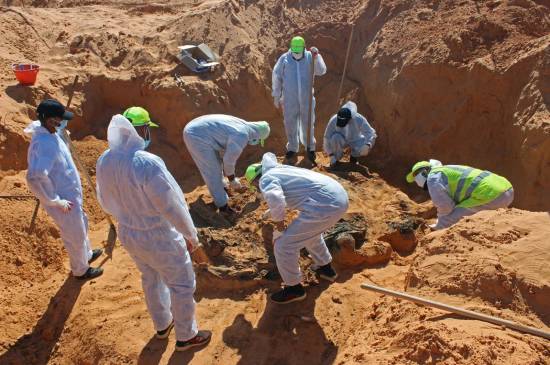HRW urges ICC to launch probe into Wagner Group's crimes in Libya
Human Rights Watch urged the International Criminal Court (ICC) to launch a probe into allegations of the use of land mines by Russian mercenaries fighting in Libya in 2019.
According to the New York-based watchdog, new data has emerged from Libyan demining groups linking mercenaries from Russia’s Wagner Group to the use of “banned booby traps” in Libya during an offensive by east-based Libyan forces trying to capture the capital of Tripoli from rival militias.
The Wagner Group backed the offensive of the east-based forces led by putschist Gen. Khalifa Haftar, who was also supported at the time by the United Arab Emirates (UAE), Egypt and Russia. Haftar’s offensive collapsed in the spring of 2020, when Turkey and Qatar stepped up their military support to the internationally recognized government in Libya.
Libya plunged into turmoil after a NATO-backed uprising in 2011 toppled dictator Moammar Gadhafi, who was later killed. It has for years been split between rival administrations, each backed by different militias and foreign powers.
Lama Fakih, HRW’s director for Mideast and North Africa, said a “transparent and international” inquiry is needed to look into the use of land mines around Tripoli.
The group said that a demining group with the Tripoli-based Defense Ministry reported that mines and other explosive ordnance killed at least 130 people and wounded 196, mostly civilians, between May 2020 and March 2022 in Tripoli’s southern suburbs.
HRW cited a tablet left on a Libyan battlefield by a Wagner mercenary that contained maps of the locations of 35 unmarked anti-personnel mines. The tablet was obtained by the BBC in early 2021. A U.N. panel of experts said earlier this week it considers the device to be authentic.
Formed back in 2014 in Ukraine and owned by businessperson Yevgeny Prigozhin, the Wagner Group is intensely involved in several conflicts. The group made its presence most pronounced in Syria and Libya, where Russia actively participated in the civil war and reportedly used the Wagner Group as its proxy in the region. The United States Africa Command (AFRICOM), on July 24, 2020, accused Russia of “playing an unhelpful role in Libya by delivering supplies and equipment to the Wagner group.”
The Wagner Group has 2,000 personnel in Libya, according to the command. Currently, the group has bases in the cities of Sirte and Jufra.
According to diplomats, there are estimated to be "more than 20,000" foreign mercenaries in Libya, and Libyan authorities, U.N. officials and world powers have demanded that these mercenaries leave./AP


